On Wednesday, the morning after news broke that a police officer had shot a Black man named Alton Sterling in Baton Rouge, La., our events coordinator Alexandria Leggett posted in #technically-POC, our private Slack group for people of color at the company.

Alexandria is one of the brightest lights in the office because of her infectious energy and laughter. What I mean is, in our office of 16, it was hard to ignore that she was more solemn than normal. A few of us in the POC Slack group offered words of support. But we kept on moving.
The next day, more news. A Black man named Philando Castile had been shot by a cop in St. Paul, Minn., during a traffic stop. We again turned to the private POC group.
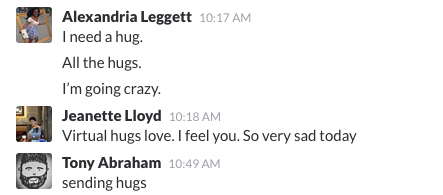
We talked about how it was harder to keep moving.
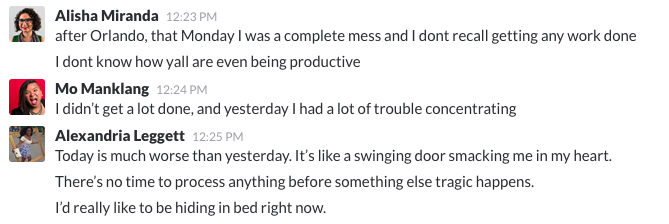
We talked about how we were grateful to work with other people of color, how we were lucky to have a space — the private POC group — to talk about our rage, our sadness.

But some felt that we needed to move the conversation out of the private group and into #general, the widest-reaching channel on our internal Slack.
In #general, our client success manager Alisha Miranda shared a Medium post from Slack engineer Erica Baker about the difficulty of carrying on at work.
Baker wrote about the importance of having time to process. The time, she wrote, “to grieve. To hurt. To be angry. To try to once again come to grips with the fact that many people in this country, especially those in power, consider us disposable at best.”
But right after Alisha posted that, another coworker posted an unrelated announcement about a new company initiative. It was the natural place for an announcement like that, but it could have been read as insensitive. It felt like one small example of what some of us in the office were dealing with: How can we carry on like it’s business as usual? (When I spoke to that coworker later, he told me he didn’t know the extent of how the office was handling the killings. He hadn’t meant to make it seem like he was ignoring what people had to say about the news.)
After that, Alisha wrote: “I thought it would be worthwhile to share with everyone here because it’s not just POC affected by this kind of news, neither should it be brushed under the rug when some of us feel somber entering work.”
And therein lies the difficulty of carrying on. The difficulty of, how do we talk about this as a company? Do we? Should we?
Our business director Brian James Kirk in #general:
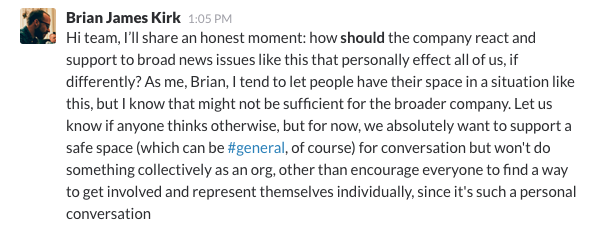
Like Baker, the Slack engineer who called for a day to process, marketing manager Jeanette Lloyd talked about the importance of “maintaining truth in [her] feelings,” of not having to pretend like it was business as usual. (WFH means work from home.)
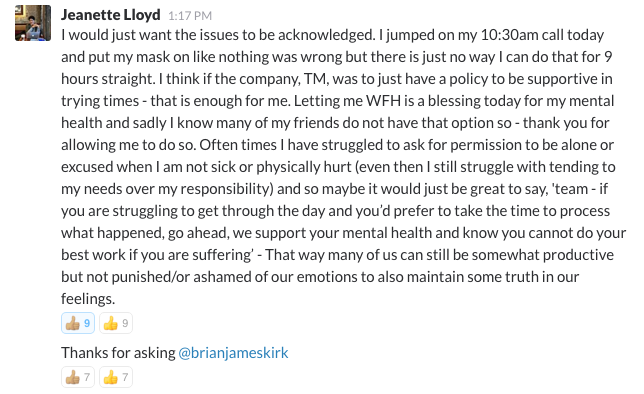
After I told her I was writing this story, Jeanette sent me this Blavity story: “An open letter to my white coworkers on days like today.” You should read it.
Alisha talked about self care.
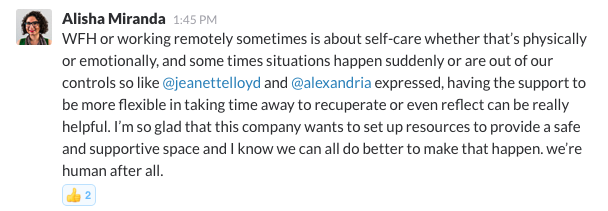
How our company struggled to both be compassionate and yet carry on made me think about what our company’s responsibility is to its employees, what our responsibility is to each other. Editorial director Chris Wink is fond of saying that we’re not a family — families love you no matter what and you don’t get to choose who your family is, neither of which is the case at our company — and I’ve found it to be a worthwhile, if sobering, concept. But during weeks like last week, there’s no avoiding the fact that we’re humans, like Alisha said, and that we need care and emotional support and time to process. Maybe work isn’t the place for that. Maybe we don’t have a choice.
We struggled with our coverage, too. We felt the need to cover the issues somehow but also felt stuck, as a niche media publication hyper-focused on location and technology. What was our responsibility to our readers?
Our editorial heads discussed it early Friday morning, in our #editorial channel, after five policemen in Dallas were fatally shot:
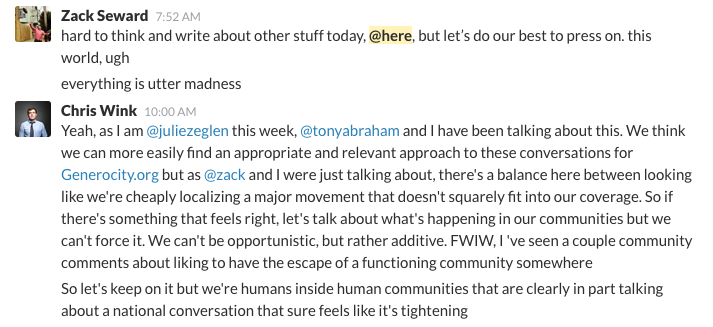
We talked about the harmfulness of seeming to carry on without acknowledging the news:
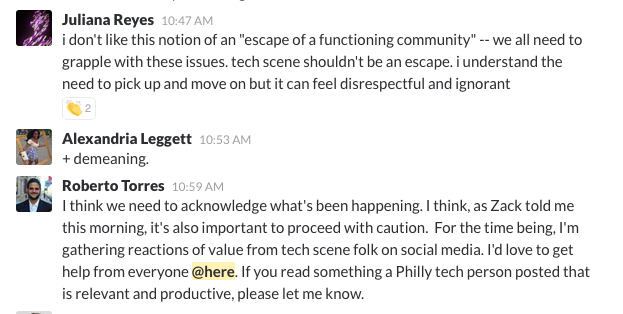
You can find Technical.ly Philly lead reporter Roberto Torres’ piece here, which culled voices from the Philly tech scene. In retrospect, the headline (“7 reactions to this week’s senseless killings”) feels too flip and doesn’t fit the tone of the actual article, which I think shared important viewpoints on the tragedies.
Our readers were split. One responded to our email newsletter with, “You have proven to be a disgrace to the city with this email,” while another wrote, “Thank you so much for compiling and sharing this content. It is incredibly important and powerful. You are appreciated.”
Editor-in-Chief Zack Seward laid out what he called a “lose-lose” situation for us as a local media publication:

One way to respond: do stories about Black entrepreneurship, like lead reporters Rana Fayez, Tyler Woods and Tajha Lanier proposed. (Which should be, and is, a part of our coverage every day, not just after a tragedy.)
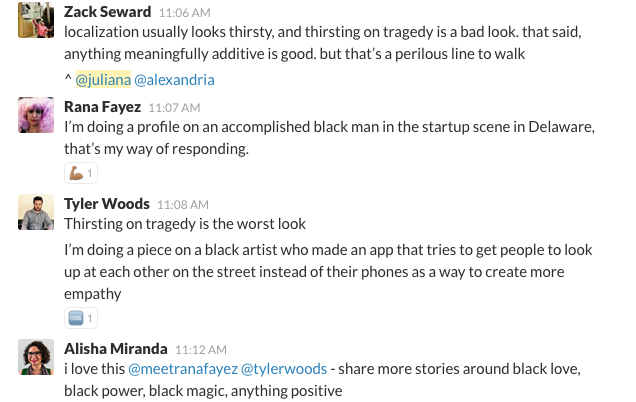
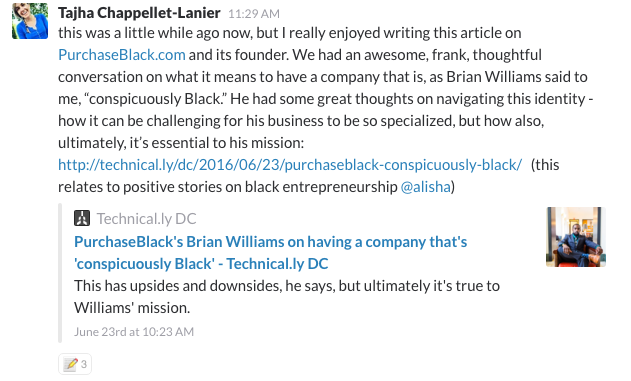
Tajha’s story on PurchaseBlack founder Brian Williams is worth a read, as is Tyler’s story about Ekene Ijeoma’s art project Look Up.
Can we localize these issues without being opportunistic? I think we can. Or we can try.

After I wrote that, Zack encouraged me to write this piece about our own company’s experience.
I was hesitant — yes, there was the fear of being opportunistic but also the fear of writing on an issue that you don’t know if you have a right to talk about — but my coworkers in the private POC group told me they thought it was a good idea to share.
If you feel comfortable doing so, tell us about how your company handled (or didn’t handle) the events of last week. Tell us about what was hard. Tell us about what you learned. We’re still trying to figure it out ourselves.
Before you go...
Please consider supporting Technical.ly to keep our independent journalism strong. Unlike most business-focused media outlets, we don’t have a paywall. Instead, we count on your personal and organizational support.
Join our growing Slack community
Join 5,000 tech professionals and entrepreneurs in our community Slack today!





